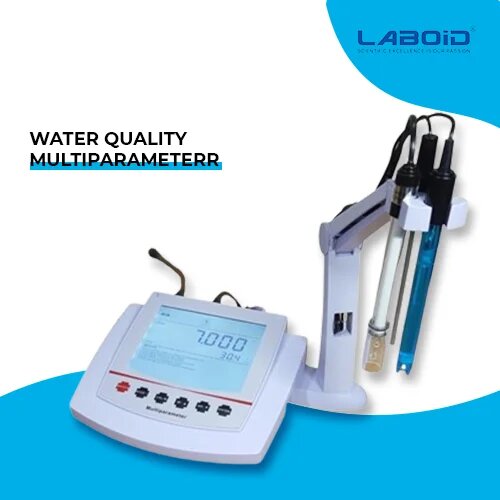
Why Multiparameter Water Quality Testing is Essential for Your Health
Water is essential for life, but it can also be a source of serious health problems if it is contaminated. Ensuring the quality of water is crucial for maintaining good health, and multiparameter water quality testing is a vital tool in this effort.
What is Multiparameter Water Quality Testing?
Multiparameter water quality testing is a comprehensive approach to analyzing the physical, chemical, and biological properties of water. This type of water quality multiparameter testing goes beyond the basic parameters, such as pH and chlorine levels, to provide a more detailed understanding of the overall water quality. By measuring a wide range of parameters, including turbidity, dissolved oxygen, conductivity, and more, multiparameter testing can identify potential contaminants and ensure that your water meets the necessary standards for safe use.
Essentiality of Multiparameter Water Quality Testing
Comprehensive Evaluation of Water Quality
Multiparameter testing provides a holistic assessment of your water, allowing you to identify and address any potential issues that could impact your health and safety. Analyzing a broad range of parameters provides a comprehensive understanding of water quality, crucial for informed decisions on water treatment and usage.
Early Detection of Contaminants
Multiparameter testing aids in identifying contaminants like heavy metals, microorganisms, and chemical residues early on, preventing potential issues. This proactive approach enables timely actions to maintain safe water for consumption and everyday use.
Compliance with Regulations
Many local and national regulations stipulate specific requirements for water quality. Multiparameter testing can help ensure that your water meets these standards, protecting you from potential health risks and legal issues.
Monitoring Water Quality Changes
Water quality can fluctuate over time due to factors such as seasonal variations, infrastructure updates, or natural disasters. Multiparameter testing helps monitor these changes and promptly identifies deviations from normal levels, allowing quick action to maintain water quality.
Health Benefits of Multiparameter Water Quality Testing
- Reduced Risk of Waterborne Illnesses: Contaminated water can harbor various waterborne illnesses, including gastrointestinal diseases, skin infections, and respiratory problems. Multiparameter testing helps identify and address these issues, reducing the risk of exposure and safeguarding your health.
- Improved Skin and Hair Health: The quality of the water you use for bathing and washing can have a significant impact on your skin and hair health. Multiparameter testing can help ensure that your water is free from harsh chemicals, minerals, or microorganisms that could cause irritation, dryness, or other skin and hair-related issues.
- Better Hydration and Nutrient Absorption: The presence of certain minerals and compounds in your water can affect the way your body absorbs and utilizes essential nutrients. Multiparameter testing can help identify any imbalances or deficiencies, allowing you to make informed decisions about water treatment or supplementation to optimize your hydration and nutrient intake.
- Reduced Exposure to Harmful Contaminants: Contaminants like heavy metals, pesticides, and disinfection byproducts can pose long-term health risks. Multiparameter testing identifies these substances, allowing you to take steps to reduce exposure and safeguard your well-being.
Implement Multiparameter Water Quality Testing for a Healthier Future
There are several ways to incorporate multiparameter water quality testing into your routine. You can:
- Utilize a home water testing kit that provides a comprehensive analysis of your water quality.
- Hire a professional water testing service to conduct a thorough evaluation of your water.
- Install a whole-home water filtration system that includes multiparameter monitoring capabilities.
Regular multiparameter water quality testing is crucial for ensuring the safety and purity of the water you use daily for drinking, bathing, and household activities.
Key Parameters for Multiparameter Water Quality Testing
The key parameters that should be measured in a water quality test include:
- pH: Tests the acidity or alkalinity of the water.
- Turbidity: Assesses the clarity of the water.
- Dissolved Oxygen: Assesses the level of dissolved oxygen in the water.
- Conductivity: Measures the ability of the water to conduct electricity, which is related to the amount of dissolved minerals.
- Total Dissolved Solids (TDS): Measures the total amount of dissolved solids in the water.
- Heavy Metals: Tests for harmful heavy metals like lead, mercury, and arsenic.
- Microbiological Contaminants: Measures the presence of harmful bacteria, viruses, and other microorganisms.
- Organic Compounds: Tests for organic chemicals like pesticides and disinfection byproducts.
By understanding the key parameters and how they affect water quality, laboratory instruments you can make informed decisions to ensure the safety and purity of the water you and your family use every day.
FAQs
Q1. What is the difference between a basic quality test and a multiparameter water quality test?
Ans. A basic water quality test usually checks key parameters like pH and chlorine levels. Multiparameter testing assesses a wide range of physical, chemical, and biological properties. This thorough approach offers a comprehensive assessment of water quality.
Q2. How often should I conduct a multiparameter water quality test?
Ans. The frequency of multiparameter water quality testing should be based on your individual needs and situation. Increase the frequency if you observe changes in taste, smell, appearance, or if you rely on a private well or water source.
Q3. Can multiparameter water quality testing detect the presence of microorganisms?
Ans. Yes, multiparameter testing can identify harmful microorganisms like bacteria, viruses, and protozoa. This aspect of testing is crucial, as waterborne illnesses can severely impact health.
Q4. How do I interpret the results of a multiparameter water quality test?
Ans. The results from a multiparameter test offer detailed information on measured parameters and safe levels. For questions or concerns about these results, consulting a water quality expert or local health department is recommended.
Q5. Can multiparameter water quality testing help me choose the right water treatment system for my home?
Ans. Absolutely. Multiparameter testing provides thorough data to identify contaminants and water issues in your home. This helps you choose the right water treatment system, supported by laboratory equipment manufacturers, to ensure your water is safe and pure.


